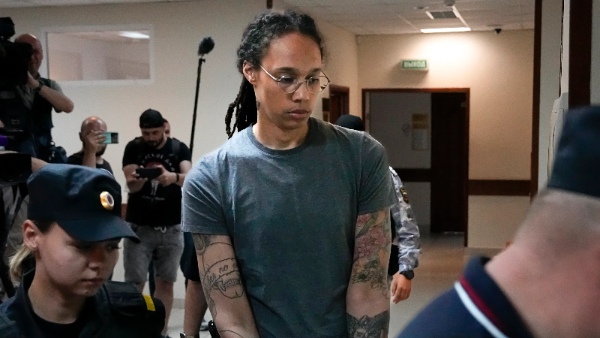Brittney Griner, the American basketball star, has been relocated to a correctional colony in Yavas, in the western Russian province of Mordovia, her attorneys announced Thursday, putting an end to days of uncertainty about her location.
Her attorneys, Maria Blagovolina and Alexander Boykov, expressed gratitude to everyone who has contacted out in support.
“First, on behalf of Brittney, we would like to thank everyone who has expressed care for her,” they said in a statement. “We can confirm that Brittney began serving her sentence at IK-2 in Mordovia.
“We visited her early this week. Brittney is doing as well as could be expected and trying to stay strong as she adapts to a new environment. Considering that this is a very challenging period for her, there will be no further comments from us.”
The US State Department said on Wednesday that it had spoken with Griner’s legal team and was aware of allegations that she had been transferred to a prison colony about a seven-hour drive southeast of Moscow.
Brittney Griner speaks before a Russian court upholds her conviction.
“However, the Russian Federation has still failed to provide any official notification for such a move of a U.S. citizen, which we strongly protest. The Embassy has continued to press for more information about her transfer and current location,” a spokesperson said.
Griner’s supporters previously stated that she was transported from an Iksha detention center on November 4 and that she was sent to a penitentiary colony, but “we do not have any information on her specific current whereabouts or her eventual destiny.” The attorneys, as well as the US Embassy, should be alerted upon her arrival at her destination, according to regular Russian protocol. Notification is sent through official mail and can take up to two weeks to arrive.”
According to her agent, Lindsay Colas, the Olympic gold winner and former WNBA champion is attempting to stay strong after being apart from her loved ones for nine months.
“At this time, we will not be sharing any further details, but want to express our deepest thanks to the Biden Administration, the Richardson Center, and to everyone who has reached out to offer words of encouragement to her,” she said. Letters have poured in from around the world and BG has been buoyed by the support. Each letter matters and we encourage everyone to continue to write and share your support.”
According to its website, the Richardson Center for Worldwide Engagement “promotes global peace and conversation by finding and pursuing areas of opportunity for engagement and citizen diplomacy with nations and people not typically available to more traditional diplomatic channels.”
Colas stated earlier this week that the key focus has been Griner’s health and well-being.
While circumstances in Russian penal colonies vary, political detainees are frequently kept in severe conditions, including “solitary incarceration or punitive stints in mental institutions,” according to the State Department’s human rights report.
According to Bill Richardson, Griner and Whelan might be released before the end of the year.
According to the article, Russian legislation also permits for forced labor in correctional colonies, and detainees have been tortured to death in some circumstances. According to the study, there have also been accusations of jail staff soliciting detainees to mistreat other inmates.
It’s not unusual for Griner’s staff to have been unaware of her location previously. According to Amnesty International, transfers to correctional colonies are covert processes in Russia, with families and attorneys sometimes ignorant of where a prisoner is being taken for several days.
Griner’s appeal against a nine-year drug sentence was denied last month. She was arrested in February and convicted in August after admitting to having cannabis-infused vape cartridges. She has frequently apologized for bringing a little amount of the narcotic into the nation, where she spent the offseason playing basketball.
Mordovia is also the location of American Paul Whelan’s detention. The former US Marine is serving a 16-year sentence in another prison colony on espionage allegations that he disputes.
Griner’s incarceration has fueled fears that she is being exploited as a political pawn in Russia’s conflict with Ukraine.
According to a research by the Poland-based think tank the Centre for Eastern Studies, known as the OSW, the majority of Russia’s jails are penal colonies where convicts are kept in barracks and are frequently compelled to labor. According to the group, there were around 800 such institutions in Russia as of 2019.
Most of the colonies were built under the Soviet Union and have been compared to Soviet-era gulags, which were prison camps that spread over the region during Josef Stalin’s dictatorship in the mid-20th century.
According to the Globe Prison Brief, Russia shelters about half a million convicts, one of the highest rates in Europe, but numbers have been declining in recent years, in contrast to most other countries of the world.
Today, the amount of monitoring and limitations imposed on offenders is determined by the facility to which they are condemned. Although not all demand labor, numerous prominent dissidents, campaigners, and foreign nationals who have been transported to colonies have had traumatic and challenging experiences.
Inmates are frequently transported around the nation. According to Amnesty International, journeys to colonies are perilous and might last up to a month. According to the OSW, the travels frequently take place in confined railway compartments, and detainees frequently arrive in overcrowded facilities with poor and old equipment.
“Despite several attempts to reform the prison system in Russia, they still resemble the Soviet Gulag,” the organization said. “Human rights violations and torture are common.”

